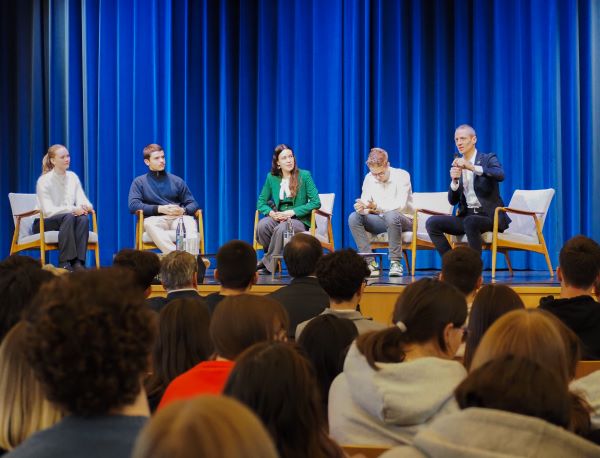 (L-R) Frida Thorsteinsdottir; Stephen Belo Alvarenga; Lara Bertemes; Julien Lemmer Veloso; Serge Wilmes, Luxembourg’s Minister of the Environment, Climate and Biodiversity;
Credit: MECB
(L-R) Frida Thorsteinsdottir; Stephen Belo Alvarenga; Lara Bertemes; Julien Lemmer Veloso; Serge Wilmes, Luxembourg’s Minister of the Environment, Climate and Biodiversity;
Credit: MECB
On Wednesday 26 November 2025, nearly 150 students from five Luxembourg secondary schools took part in a meeting focused on the COP30 climate summit and the role of young people in climate action.
Students from Athénée de Luxembourg, Lycée Robert Schuman, École Nationale des Adultes, Nordstad-Lycée Diekirch and Atert-Lycée Redange met for a second exchange with Serge Wilmes, Luxembourg’s Minister of the Environment, Climate and Biodiversity, and Claude Meisch, Minister of Education, Children and Youth.
According to Luxembourg's Ministry of the Environment, Climate and Biodiversity and the Ministry of Education, Children and Youth, the session made it possible to address in depth the main outcomes of COP30 in Belém, Brazil and their implications for Luxembourg.
The programme featured an introduction by Marc Dosser, Deputy Director of the Athénée de Luxembourg. The meeting offered a space for the students to express their concerns, share ideas and take an active role in discussions on climate policies.
On this occasion, Minister Wilmes stressed the importance of giving young people a central place in the fight against climate change, saying: "The voice of young people is essential in shaping climate policies and international negotiations, because they and future generations will face the impacts of climate change. Their presence at COP this year was crucial. I had the opportunity to exchange with students before and after the conference, including today at the Athénée. These exchanges were very enriching, and I am impressed by the quality of the students’ knowledge and their energy."
The session continued with contributions from the youth climate delegates, Lara Bertemes (2025-2026) and Frida Thorsteinsdottir (2024-2025), who presented a summary of COP30 decisions. They highlighted the absence of a roadmap for the energy transition, advances linked to the Global Goal on Adaptation, the essential role of science in guiding political action and the persistent limits in terms of climate ambition. Their intervention also outlined the implications of these results for young people and the international community, while highlighting civil society initiatives, side events and Luxembourg’s commitments.
Lara Bertemes said: "Despite the disappointing results of the COP, I left Belém with a feeling of hope. At the COP, we worked with youth delegates from the EU and from countries in the Global South, and with the support of young people in Luxembourg, we can put pressure to obtain more ambitious results next year. The students present today at the Athénée inspired me: they understand climate change well and asked many relevant questions. That is the kind of engagement we need from young people."
Frida Thorsteinsdottir added: "This type of exchange between young people and political leaders is extremely important. Young people will be the most affected by the effects of climate change over the course of their lives. This is why it is important that our voice is heard and that young people inform themselves as much as possible about climate change and about the measures we can take to address it."
Following these exchanges, the Youth 4 Climate (Y4C) Action Team, a group of students committed to climate action, shared their experience presenting concrete examples of how they contribute to the ecological transition within their schools and beyond.
Minister Meisch concluded: "In the fight against climate change, we could not have better allies than the young people who are getting involved in our schools across the country. It is now essential to translate this engagement into daily actions and behaviours, both in school and outside. This is why we consider that climate education should not be limited to certain courses but be integrated into all dimensions of school life, involving students, teachers and the entire school community. I strongly encourage young people to continue to make their voices heard: their arguments and their energy are essential to shaping the future of our planet."
According to the ministries, this meeting took place in a particularly meaningful context, as Luxembourg was awarded the first True Young Award at COP30, a European prize granted by the network of Climate Youth Delegates to recognise strong commitment to youth participation in international climate governance.
EO









